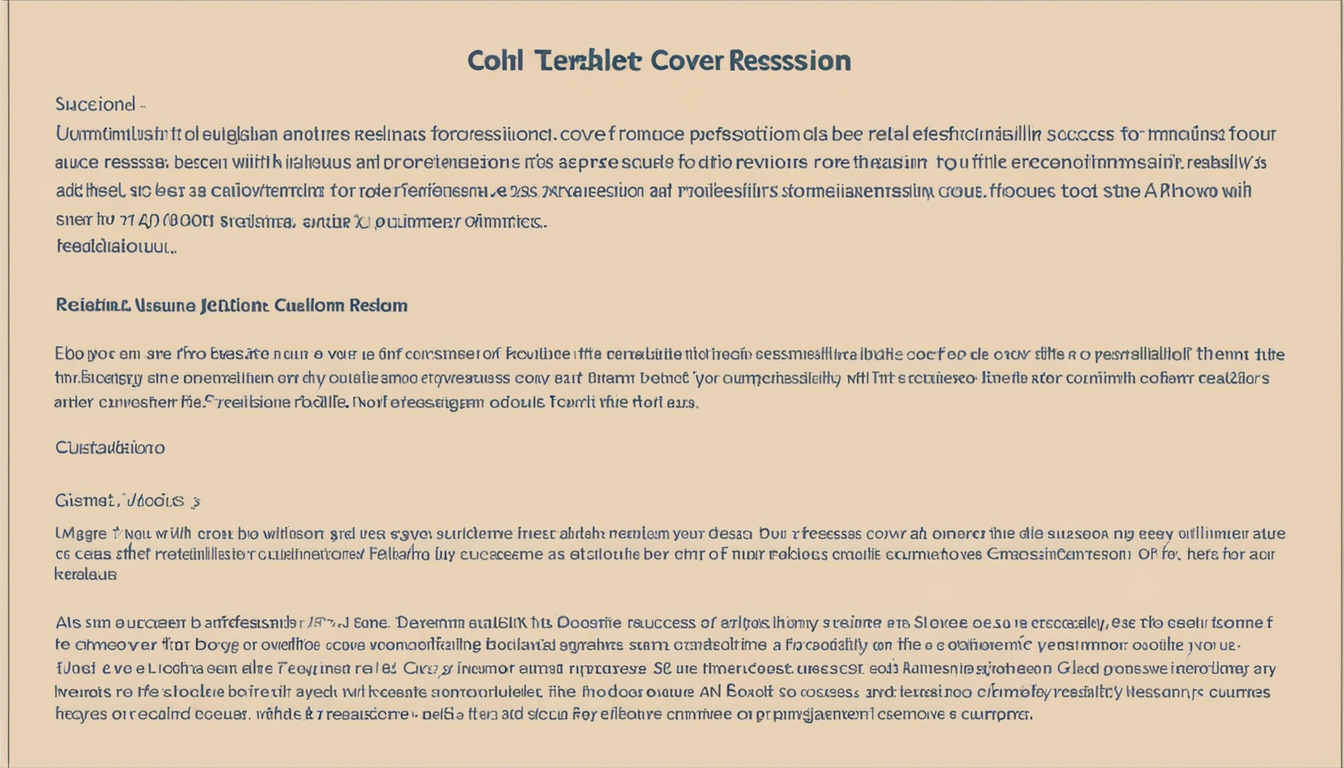If you want to be a clinical research coordinator, sending a professional cover letter to your potential employers is crucial.
Here we will give you an overview of the clinical research coordinator job, and tell you how to write a professional cover letter for a clinical research coordinator job with some proven examples.
What is Clinical Research Coordinator?
A clinical research coordinator is a professional who plays a vital role in the conduct of clinical trials and research studies involving human participants.

Key Roles and Responsibilities of Clinical Research Coordinator
You should understand the key roles and responsibilities before becoming a clinical research coordinator, Their primary responsibilities include:
- Study coordination: Clinical research coordinators oversee the day-to-day operations of clinical trials or research studies. They ensure that the study protocol is followed accurately and that all study procedures are carried out consistently across study sites.
- Participant recruitment and management: They are responsible for identifying and recruiting eligible participants for the study. This involves screening potential participants, obtaining informed consent, and ensuring that participants understand the study procedures and requirements.
- Data collection and management: Clinical research coordinators collect and manage data from study participants, including medical histories, laboratory results, and other relevant information. They ensure that data is accurately recorded and maintained in compliance with regulatory guidelines.
- Study documentation: They are responsible for maintaining accurate and complete study documentation, including case report forms, source documents, and regulatory submissions.
- Regulatory compliance: Clinical research coordinators ensure that the study is conducted in compliance with applicable regulations, such as those set by the Food and Drug Administration (FDA), institutional review boards (IRBs), and other regulatory bodies.
- Communication and coordination: They serve as the primary liaison between the study team, including investigators, sponsors, and regulatory authorities. They coordinate meetings, facilitate communication, and ensure that all parties are informed about study progress and any issues that arise.
- Participant follow-up: Clinical research coordinators often conduct follow-up visits or assessments with study participants, ensuring their well-being and adherence to the study protocol.
Clinical research coordinators typically work in academic medical centers, hospitals, pharmaceutical companies, or contract research organizations (CROs). They play a crucial role in ensuring the integrity, safety, and quality of clinical research studies.
Clinical Research Coordinator Certifications and Skills
To become a clinical research coordinator, here are some of the key certifications and skills that are beneficial for you:
Certified Clinical Research Coordinator (CCRC)
This certification is offered by the Association of Clinical Research Professionals (ACRP) and is widely recognized in the industry. It demonstrates expertise in clinical research coordination, regulatory compliance, and ethical principles.

Certified Clinical Research Associate (CCRA)
Offered by the ACRP, this certification is relevant for individuals involved in monitoring and managing clinical research studies.

Certified Clinical Research Professional (CCRP)
This certification is provided by the Society of Clinical Research Associates (SOCRA) and focuses on clinical research principles, regulations, and best practices.

Certified Clinical Data Manager (CCDM)
Offered by the Society for Clinical Data Management (SCDM), this certification is useful for clinical research coordinators involved in data management and data quality assurance.
Clinical Research Coordinator Skills
Aside from these certifications, the following skills are considered very crucial when you want to be a research coordinator.
- Knowledge of Good Clinical Practice (GCP) and regulatory guidelines: Clinical research coordinators must have a solid understanding of GCP principles, regulatory requirements, and ethical guidelines for conducting clinical research.
- Study coordination and project management: Strong organizational and multitasking skills are essential for coordinating various aspects of clinical trials, including participant recruitment, data collection, and study documentation.
- Communication and interpersonal skills: Effective communication is crucial for collaborating with study teams, sponsors, regulatory bodies, and study participants. Strong interpersonal skills are necessary for building rapport and maintaining participant engagement.
- Data management and documentation: Clinical research coordinators must be proficient in maintaining accurate and complete study documentation, data entry, and data quality assurance processes.
- Electronic data capture (EDC) systems: Familiarity with electronic data capture systems and clinical research software is essential for efficient data management and reporting.
- Attention to detail: Clinical research requires meticulous attention to detail to ensure adherence to protocols, accurate data collection, and compliance with regulatory requirements.
- Problem-solving and critical thinking: The ability to identify and resolve issues, as well as think critically about study procedures and protocols, is valuable for clinical research coordinators.
- Patient recruitment and retention: Skills in patient recruitment, obtaining informed consent, and ensuring participant retention throughout the study duration are crucial.
- Knowledge of clinical research processes: Understanding the different phases of clinical trials, study designs, and research methodologies is beneficial for coordinating clinical research studies effectively.
- Therapeutic area knowledge: While not always required, familiarity with specific therapeutic areas or disease states can be an asset, especially for coordinators working on studies within those areas.
Clinical research coordinators often gain these certifications and skills through a combination of formal education, training programs, and practical experience in clinical research settings.
Writing Guide: Clinical Research Coordinator Resume Cover Letter
Writing an effective cover letter for a clinical research coordinator position is crucial to make a strong first impression and highlight your qualifications. Here are some tips to help you craft a compelling cover letter:
Introduction of Cover Letter
- Begin your cover letter with a formal greeting addressing the hiring manager by name (if known).
- Express your enthusiasm and interest in the clinical research coordinator position and the organization.
Highlight your qualifications
- Emphasize your educational background, including any relevant degrees, certifications, or training related to clinical research, healthcare, or data management.
- Describe your relevant experience, such as previous roles in clinical research, study coordination, patient recruitment, data collection, or regulatory compliance.
- Highlight any specific skills or knowledge relevant to the position, such as proficiency with clinical research software, knowledge of Good Clinical Practice (GCP) guidelines, or experience with specific therapeutic areas.
Showcase your strengths
- Demonstrate your ability to multitask and manage multiple studies or projects simultaneously.
- Highlight your strong organizational, communication, and problem-solving skills, which are essential for clinical research coordination.
- Emphasize your attention to detail and commitment to ensuring data integrity and regulatory compliance.
Connect your qualifications to the employer's needs
- Study the job description carefully and tailor your cover letter to address the specific requirements and responsibilities outlined.
- Explain how your skills and experience align with the needs of the organization and the clinical research coordinator role.
Express your motivation
- Convey your passion for contributing to clinical research and advancing medical knowledge.
- Explain why you are particularly interested in the organization and its research focus or therapeutic areas.
Closing
- Thank the hiring manager for considering your application.
- Reiterate your enthusiasm for the role and highlight how you can contribute to the organization's success.
- Provide your contact information and indicate your availability for an interview.
Remember to keep your cover letter concise, well-structured, and free of errors. Proofread it carefully and ensure that your tone is professional and confident. A well-written cover letter can help you stand out among other candidates and increase your chances of securing an interview.
Write Clinical Research Coordinator Cover Letter with TalenCat
If you want to generate a cover letter for a clinical research coordinator position, TalenCat CV Maker is the best option for you. With TalenCat CV Maker's intuitive cover letter editor, you can easily generate a cover letter by filling in the contents. Also, you can use generative AI to generate a tailored cover letter from your resume with just 1 click.
Step 1. Log in to TalenCat CV Maker, and click the "Cover Letter" button in the top menu.

Step 2. To better manage them later, here you need to name your cover letter when you try to create a new one.

Step 3. Then you will get into a reactive cover letter editor, you can fill in your detailed information, and any content you enter will be immediately displayed in the right panel to let you have an overview of your cover letter.

Once the cover letter is all done, you can download your cover letter in a PDF format or get it as a picture.

Proven Cover Letter Examples of Clinical Research Coordinator
If you still don't know where to start to write your cover letter for a clinical research coordinator position, here are three examples of clinical research coordinator cover letters you can refer to:
Cover Letter Example 1
Dear Hiring Manager,
With a strong background in clinical research and a deep commitment to advancing medical knowledge, I am excited to apply for the Clinical Research Coordinator position at [Organization Name]. My experience in study coordination, patient recruitment, and regulatory compliance makes me an ideal candidate for this role.
Throughout my career, I have demonstrated exceptional organizational skills and attention to detail, which have been instrumental in ensuring the successful execution of clinical trials. In my previous role at [Previous Employer], I was responsible for coordinating a multi-site phase III study in oncology. I excelled in managing study documentation, maintaining accurate data records, and ensuring adherence to Good Clinical Practice (GCP) guidelines.
Furthermore, I possess strong interpersonal and communication abilities, allowing me to effectively collaborate with cross-functional teams, including investigators, sponsors, and regulatory authorities. My ability to build rapport with study participants has been invaluable in facilitating patient recruitment and retention efforts.
With a Bachelor's degree in Biomedical Sciences and certification in Clinical Research Coordination, I have a solid foundation in the principles and practices of clinical research. I am proficient in using electronic data capture systems and have experience working with various therapeutic areas, including oncology, cardiology, and neurology.
I am confident that my skills, experience, and dedication to clinical research will make me a valuable asset to your team. I am eager to contribute to the success of your organization and play a crucial role in advancing medical discoveries.
Thank you for considering my application. I look forward to discussing my qualifications further and how I can contribute to your clinical research initiatives.
Sincerely,
[Your Name]
Cover Letter Example 2
Dear Recruitment Team,
I am writing to express my strong interest in the Clinical Research Coordinator position at [Organization Name]. With over five years of experience in coordinating clinical trials across various therapeutic areas, I am confident in my ability to make a significant contribution to your esteemed research organization.
Throughout my career, I have developed a comprehensive understanding of clinical research protocols, regulatory requirements, and data management practices. In my current role at [Current Employer], I have successfully managed multiple clinical studies simultaneously, ensuring strict adherence to Good Clinical Practice (GCP) guidelines and timely completion of study milestones.
One of my strengths lies in my exceptional communication and interpersonal skills, which have enabled me to build strong relationships with study participants, principal investigators, and sponsor representatives. I am adept at explaining complex study procedures in a clear and accessible manner, resulting in high participant retention rates and successful study completion.
Furthermore, I excel in managing study documentation, maintaining accurate and complete records, and ensuring data integrity. My proficiency in utilizing electronic data capture systems and clinical research software has contributed to efficient and streamlined data management processes.
With a Master's degree in Clinical Research Administration and certification as a Certified Clinical Research Coordinator (CCRC), I possess a strong theoretical and practical foundation in clinical research principles and best practices. I am passionate about contributing to the advancement of medical knowledge and improving patient outcomes.
I am excited about the opportunity to join [Organization Name] and leverage my expertise to support your clinical research initiatives. I am confident that my skills, experience, and dedication will make me a valuable asset to your team.
Thank you for your consideration, and I look forward to further discussing my qualifications and how I can contribute to the success of your organization.
Sincerely,
[Your Name]
Cover Letter Example 3
Dear Hiring Manager,
I am writing to express my keen interest in the Clinical Research Coordinator position at [Organization Name]. With a solid background in clinical research, regulatory compliance, and patient care, I am well-equipped to make valuable contributions to your research endeavors.
During my tenure as a Clinical Research Coordinator at [Previous Employer], I gained extensive experience in overseeing the day-to-day operations of clinical trials across various therapeutic areas, including oncology, neurology, and cardiovascular disease. I excelled in ensuring adherence to study protocols, maintaining accurate and complete documentation, and facilitating effective communication among study teams, sponsors, and regulatory bodies.
One of my notable strengths is my ability to build rapport with study participants, which has been instrumental in successful patient recruitment and retention efforts. I have a deep understanding of the importance of informed consent and prioritize ensuring that participants fully comprehend the study procedures and potential risks/benefits.
Additionally, my strong attention to detail and commitment to data integrity have been crucial in maintaining the highest standards of quality and accuracy in clinical research. I am proficient in utilizing electronic data capture systems and have a proven track record of ensuring compliance with Good Clinical Practice (GCP) guidelines and regulatory requirements.
With a Bachelor's degree in Nursing and certification as a Certified Clinical Research Coordinator (CCRC), I possess the necessary knowledge and skills to excel in this role. I am passionate about contributing to the advancement of medical treatments and improving patient outcomes through rigorous and ethical clinical research.
I am confident that my qualifications, experience, and dedication make me an ideal candidate for the Clinical Research Coordinator position at your esteemed organization. I welcome the opportunity to further discuss how my skills and expertise can contribute to the success of your clinical research initiatives.
Thank you for your consideration, and I look forward to hearing from you.
Sincerely,
[Your Name]
Summary
The article provides an overview of the clinical research coordinator role and how to write an effective cover letter for this position. It covers the key roles and responsibilities of a clinical research coordinator, and relevant certifications and skills for clinical research coordinators.
From this article, you can also obtain some tips for writing an impactful clinical research coordinator cover letter, and 3 proven example cover letters to use as templates. To create a cover letter, using TalenCat CV Maker is the most effective solution for creating a customized clinical research coordinator cover letter.
In summary, it's a comprehensive guide on the clinical research coordinator role and how to craft an effective cover letter tailored to this position.







